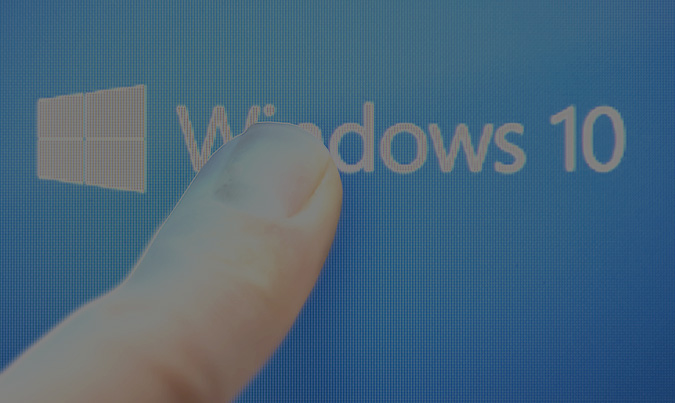A Future Without Windows Is a Dystopian Nightmare
I had a nightmare last night. In it, my company hired a new head of IT, who decided to "lock down" all of our computers so that we couldn't install software or change any settings — or even the wallpaper, which was filled with company logos. Many companies operate with policies like this, because they don't trust their employees and thus treat them like children. As for actual children, schools have found the perfect locked-down computer for them: the Chromebook.

This week, we found out that Chromebooks are outselling Macs (but still not Windows PCs) for the first time. Already, Chromebooks account for more than 50 percent of the K-12 market. My colleague, Mark Spoonauer, says these stats show that Chrome OS is the future and Windows is the past. I hope he's wrong, because he's envisioning a dystopian future where there are two kinds of people: those who consume and those who create.
Imagine a future where there are two very distinct classes of people: builders and users.
Although you can change their desktop wallpaper, today's Chromebooks are the very definition of locked boxes. You can install a few sandboxed apps, most of which are web pages, and you can surf the web. That's a good scenario for parents and school administrators, because they don't want children installing viruses, piling on pirated software or using age-inappropriate apps. School IT managers can add content filters to their networks so kids aren't able to visit the wrong websites.
MORE: Why We're Heading Toward a Windows-Less World
The problem with Chrome OS (and Android) machines is that they're not good for coding or creating content of any kind. The people who actually build the sites and software you use on a Chromebook or an Android tablet are using Windows, Linux or Mac OS computers to do their work. You can post to social media or do a webcast from Chrome OS, but if you want to do "real" media editing, you need a real computer. Even a $200 Windows 10 laptop can run basic development tools such as Visual Studio Express or simple video editors like Windows Movie Maker.
We learned this week that Google will soon provide a way to load Android apps on to Chromebooks, which will make them much more versatile. But that still won't turn them into content-creation systems. The major development and content-creation tools don't run on Android, and with their tiny storage drives and slow CPUs, Chromebooks aren't meant for coding, rendering 3D models or editing large videos. And if Google ever beefed up its laptops' hardware to appeal to content creators, they'd stop being simple and idiot-proof — the very reasons schools buy them today.
Do you want to live in a future where only a few people with "open PCs" have the ability to change the world
In his column, Mark says, "At some point, today's kids may 'graduate' to a Windows machine, but when you grow up with Chrome OS and it's easy and familiar, there might not be much incentive to switch."
Stay in the know with Laptop Mag
Get our in-depth reviews, helpful tips, great deals, and the biggest news stories delivered to your inbox.
MORE: Should You Buy a Chromebook?
Imagine a future where the world is divided between builders and users. Builders create the applications and content that users consume. Today, we live in a world where most people are users, even if they have Windows or Mac OS. But at least with those desktop platforms, there's the opportunity to take the reins and start coding an app, building your own website from scratch or installing software that's not been endlessly sandboxed and prescreened for you.
With Chrome OS, you're a passive player who cannot take full control of your device or your experience. Sure, having a stripped-down platform is always going to be easier than having choices. A simple toaster with a single plunger button will always be easier to use than a toaster oven with dials on it. But do you want to live in a future where only a few people with "open PCs" have the ability to change the world, while the rest of us just live in it?
Image Credit: Shutterstock / Vladimir Gjorgiev
Laptop Guide
- Laptop Buying Guide: 8 Essential Tips
- The Best & Worst Laptop Brands
- Laptop Tech Support Showdown: Undercover Report
- Should I Buy a Chromebook? Buying Guide and Advice
- Laptops with the Longest Battery Life
- Chromebooks vs. Windows 10 Laptops: What Should You Buy?
- Why You Shouldn't Buy a Touch-Screen Laptop
- Out of the Box Tips: Set Up Your New Laptop Like a Pro
- The Best Time to Buy a Laptop
- Chromebook vs. Tablet: Which Should You Buy?
- Laptop Buying Tips for Students
- 10 Key Features to Look for in Your Laptop
- How to Buy a 2-in-1 Laptop Hybrid
- USB Type-C FAQ: Everything You Need to Know
- How to Get Rid of Your Old Laptop
- Laptop Warranties: What They Cover
- Which CPU is Right For You?
- Which Laptop Features Are Worth the Money?
- Gaming Laptop Buying Guide: Find the Right Rig
- 10 Reasons Why Consumers Should Buy Business Laptops
- Which MacBook is Right for You?
- 5 Things to Look For in Your Next Laptop Keyboard
- How to Configure Your Laptop: Specs That Matter
- Which Graphics Card Do You Need?
- The Perfect Laptop? Here’s What It Should Have
- Why 78 Percent of Laptop Screens Suck
- A Guide to Computer Ports and Adapters
- 13 Ways to Make a Slow Laptop Faster
- How to Tell If You Can Upgrade Your Laptop
- Laptop Locks Guide: Do You Need One?
- 10 Features You Can Skip to Save Money

